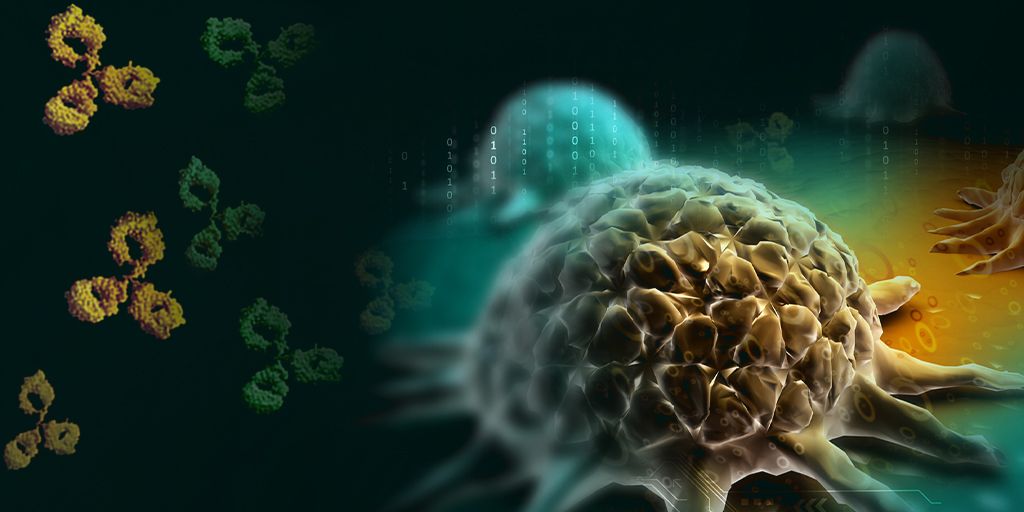
Cancer is a deceptively singular term for hundreds of different diseases. These diseases can affect almost any part of the body. In the United States, cancer is the second most common cause of death (1). At its most basic level, however, cancer is the abnormal and uncontrolled division of cells resulting from genetic changes in one or more cells.
This prolific cell division is what many standard chemotherapies act upon. These therapies are developed to kill rapidly dividing cells but often don’t discriminate between normal and cancerous cells. In contrast, targeted therapies are designed to interact with (or target) specific pathways, processes or proteins whose abnormal behavior is associated with cancer development and growth. Targeting these abnormal cellular functions can counteract cancer in different ways. They can interfere with tumor growth, carry other drugs into tumor cells or help the immune system find and kill cancerous cells. Targeted therapies can be loosely divided into two categories: small molecule therapies and immunotherapies.
Small Molecule Therapies: Signal Transduction Inhibitors
Small molecule therapies are drugs that are small enough to enter cells easily. These drugs can be used to target biomolecules inside or on the surface of cancer cells. These molecules are often targeted at the cellular functions and pathways that help cancer cells spread. Examples of small molecule therapeutics include protease inhibitors, kinase inhibitors and angiogenesis inhibitors.
Uncontrolled or excessive cell division has many different causes, including mutations in cell signaling pathways that drive cell proliferation, remove the normal cell cycle controls or promote cell survival. Targeting these mutated and malfunctioning pathways with small molecules that block the aberrant signals of these cellular pathways can stop tumor growth and inhibit its spread. Examples of these inhibitor therapies include kinase inhibitors, protease inhibitors and inhibitors of angiogenesis (the process of forming new blood vessels) (2–5). An new and exciting alternative to inhibiting protein activity is using compounds such as proteolysis targeting chimeras (PROTACs) to selectively target certain proteins for degradation.
Immunotherapies
The immune system is a complex process that the body uses to recognize and destroy abnormal cells. Unfortunately, cancer cells frequently find ways to evade detection by our immune system, allowing them to grow and spread. Immunotherapies all leverage the natural immune process to fight cancer, but they do so in several different ways.
Monoclonal Antibodies
Antibodies are proteins produced by the immune system when it detects something that is foreign to the body (e.g., viruses, bacteria, pollen and abnormal cells). They tag these things for destruction by T-cells. Cancerous cells frequently have mechanisms that help them evade detection by the immune system, allowing them to grow unchecked. Monoclonal antibodies (mAbs) are created antibodies that can be used to target cancer in several different ways. mAbs that recognize specific protein markers for cancer can tag these cells, helping the body’s normal immune system recognize and destroy them. They can also be used to disrupt the function of growth factor receptors found on the cell surface that help cancer cells divide. mAbs can work by blocking the receptors or disrupting the signal that causes the cell to continue dividing. Conjugated mAbs can be attached to chemotherapy drugs or radioactive particles, which allows these treatments to be targeted to cancerous cells. This approach can help these treatments work more effectively and also limits side effects. Bi-specific mAbs are designed to attach to two proteins at once. For example, they can attach a cancer cell and a T-cell, helping the body recognize and destroy the cancerous cell (6).
Finally, mAbs called immune checkpoint inhibitors target the proteins that cancer cells use to avoid activating an immune response. Immune checkpoints are important immune regulators that keep the immune system from becoming overactive and attacking healthy tissues. They work by either stimulating or inhibiting an immune response. Cancer cells use checkpoints to evade detection by T cells by signaling that they are ‘normal’ cells. Immune checkpoint inhibitors block these checkpoints on the cell surface, thereby allowing T cells to recognize and kill the cells (7)
Chimeric Antigen Receptor T-cell (CAR T) Therapy
CAR T-cell therapy is a method of supercharging the natural immune system to recognize and destroy cancer cells. The process uses T cells that are collected from a patient and modified to attach an antibody-like protein called a chimeric antigen receptor (CAR) that will help the T cells detect cancer cells. The CAR T cells are propagated in the laboratory and then returned to the patient where they act to detect and destroy cancer cells. CAR T-cells remain active in the body and can help prevent cancer from returning (8).
Conclusion
Cancer is a complex and devastating disease that we are still struggling to understand. Small Molecule Therapies and Immunotherapies offer great promise for more effective treatment options. The development of these therapies depends on research that advances our understanding of the molecular mechanisms of cancer development and growth.
References
- American Cancer Society. Risk of Dying from Cancer Continues to Drop at an Accelerated Pace. Accessed January 24, 2023.
- Park, K.C. et al (2020) Int J Mol Sci. 21(18), 6805.
- Rudzińska, M. I. (2021) Drug Des. Devel.Ther. 15, 9.
- Zhong, L. et al. (2021) Sig. Transduct. Target. Ther. 6, 201.
- Cicenas, J. et al. (2018) Cancers (Basel). 10(3), 63.
- Zahavi, D. and Weiner, L. (2020) Antibodies (Basel). 9, 34.
- Zam, W. and Ali, L. (2022) Curr. Rev. Clin. Exp. Pharmacol. 17, 103.
- Roy, R. et al. (2023) Vaccines 11, 59.
